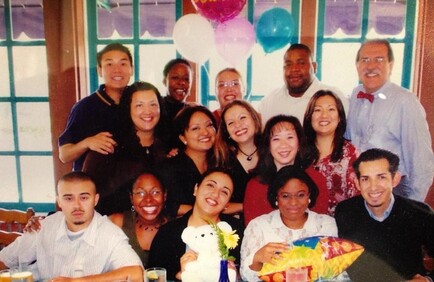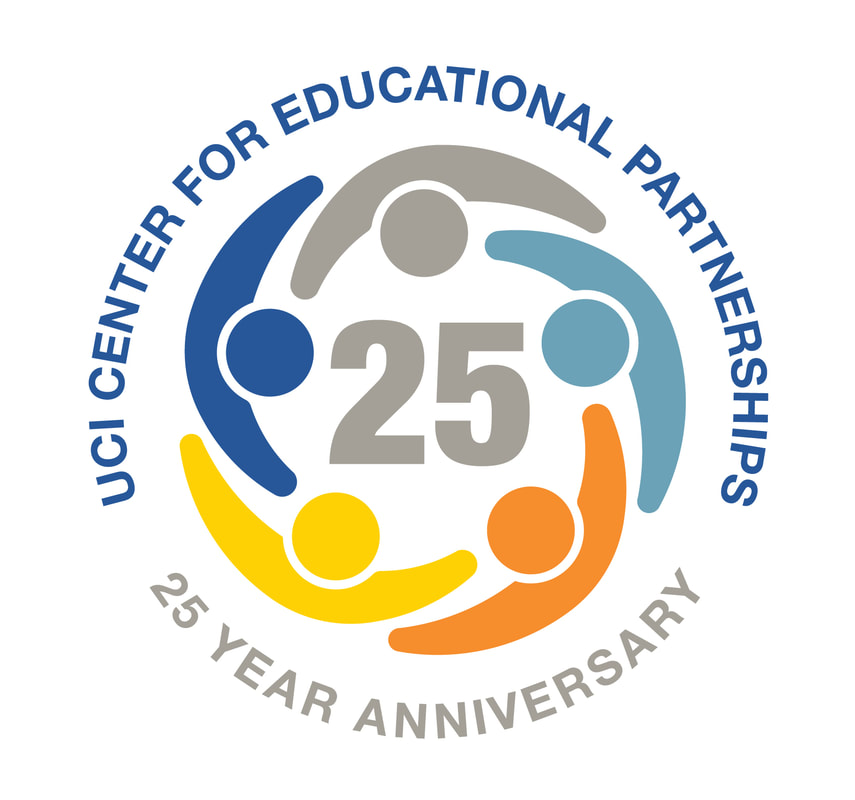THE CAREER LAUNCHER
|
The impact of the Center for Educational Partnerships on Southern California community colleges is easy to see. Not only because CFEP collaborates directly with so many campuses, but because a number of community colleges have counselors, deans, and even presidents first cut their teeth working at CFEP.
Take for example, Dr. Keith Curry, the president and CEO of Compton College and Compton Community College District, and Dr. Mike Muñoz, the interim superintendent-president of Long Beach Community College. In 1999, Curry started as a program coordinator at CFEP and later earned his Ed.D. from the UCI Department of Education in 2011. Also in 1999, Muñoz attended CFEP’s Summer Scholars Transfer Institute at UCI and, after graduating from UCI in 2002, also became a program coordinator for CFEP. “Throughout my career, my values as a teacher and an educator reflect the support and mentorship I received from [CFEP Founding Director] Dr. Juan Francisco Lara and the values imparted by CFEP faculty and staff,” Muñoz says. “These include promoting social justice, equity and inclusion; putting students first; considering outcomes; using data-driven research; building confidence in others; growing professionally; and modeling desired behavior – all qualities I associate with CFEP.” |
Curry and Muñoz are just two among a half dozen community college leaders who launched their careers starting at CFEP.
“The center has done major work with community colleges and transfer opportunities, an area now coming to the forefront once again among California educational leaders,” said Manuel Gómez, who was UCI’s vice chancellor of student affairs from 1995 to 2010, and helped found CFEP. “We developed extraordinary leaders within the center, who have helped fulfill dreams of thousands of other students. The impact is honestly immeasurable.”
“The center has done major work with community colleges and transfer opportunities, an area now coming to the forefront once again among California educational leaders,” said Manuel Gómez, who was UCI’s vice chancellor of student affairs from 1995 to 2010, and helped found CFEP. “We developed extraordinary leaders within the center, who have helped fulfill dreams of thousands of other students. The impact is honestly immeasurable.”
|
Former CFEP staff, now at community colleges across the Southland, lead programs and initiatives that extend CFEP’s mission to more communities and more students.
Dr. Adrienne Grayson, associate dean of educational partnerships at Riverside Community College, began an 18-year tenure at CFEP as a student employee in 1998. “My passion and my calling is working with first-generation, low-income students of color and historically underrepresented students,” Grayson said. “CFEP served those students unapologetically, and that’s always given me the courage to be intentional and unapologetic about who we are here to serve, too. “CFEP was talking about equity — and working toward equity — 20 years before that became a buzzword,” Grayson added. Like Grayson, Dr. Elaine Lipiz Gonzalez started working for CFEP as a UCI undergraduate. Today, she is the dean of student support services at Fullerton College. Both of them recall the center’s workplace culture being like “family,” and both said they try to emulate the culture of service and dedication to students that they learned at CFEP. |
“At CFEP, we understood that every student we worked with was a world of possibility, and we could help them achieve whatever goal they envisioned for themselves,” said Gonzalez, who spent nearly a decade with CFEP, ultimately directing the UCI SAGE Scholars Program.
|
“For me, it was a natural transition to the community college system that, at its core, is about providing access to historically marginalized communities – whether it’s for a certificate, lifelong learning or to transfer to a four-year university,” Gonzalez added.
Because CFEP serves students through partnerships with K-12 schools, community colleges and other four-year institutions, its staff collaborate with a wide range of organizations and students at different stages in their education. Rudy Santacruz first experienced CFEP as a middle school student in Santa Ana, when he participated in the Saturday Math Academy. He started working at CFEP when he was a UCI undergraduate, and spent the first eight years of his professional career working with Early Academic Outreach Program and UCI SAGE Scholars Program. But it was his involvement with CFEP’s Summer Scholar Transfer Institute that set him on his path to counseling. |
“Working with the SSTI, I saw the work that community college counselors were doing, and I fell in love – that really planted the seed,” said Santacruz, who is now a counselor at Mt. San Antonio College. “CFEP gave me exposure to K-12 and higher education, so I had the opportunity to taste a lot of different areas and explore what kind of work I wanted to do.”
Dr. Melba Castro is a first-generation college student who participated in UCI’s EAOP while in high school. After earning her master’s degree from Stanford University, Castro worked with the Santa Ana Partnership, holding positions at Santa Ana Unified School District, Santa Ana College and, from 2003-04, at UCI’s CFEP. The lessons gained, and the people she met, left an indelible mark.
“I worked at CFEP nearly 20 years ago, but the co-workers, supervisors, and community partners I collaborated with have consistently been part of my life as mentors, colleagues and friends,” Castro said. “The center creates organic relationships and brings together like-minded individuals who are committed to making a change in the lives of students, especially for those who come from first-generation, low-income and underrepresented backgrounds.”
Today, Castro is the dean of student success at Rio Hondo College, where she carries on the legacy of CFEP’s work.
“Having participated in the Center for Educational Partnerships as a student, working for the center, and having been a partner with the center,” Castro said, “I know it has been a transformational space for students who participate in the programs, as well as the educators and the professionals who work there.”
Dr. Melba Castro is a first-generation college student who participated in UCI’s EAOP while in high school. After earning her master’s degree from Stanford University, Castro worked with the Santa Ana Partnership, holding positions at Santa Ana Unified School District, Santa Ana College and, from 2003-04, at UCI’s CFEP. The lessons gained, and the people she met, left an indelible mark.
“I worked at CFEP nearly 20 years ago, but the co-workers, supervisors, and community partners I collaborated with have consistently been part of my life as mentors, colleagues and friends,” Castro said. “The center creates organic relationships and brings together like-minded individuals who are committed to making a change in the lives of students, especially for those who come from first-generation, low-income and underrepresented backgrounds.”
Today, Castro is the dean of student success at Rio Hondo College, where she carries on the legacy of CFEP’s work.
“Having participated in the Center for Educational Partnerships as a student, working for the center, and having been a partner with the center,” Castro said, “I know it has been a transformational space for students who participate in the programs, as well as the educators and the professionals who work there.”
The preceding story is part of the "CFEP: 25 Years of Impact" series, honoring the people, programs and partnerships that have helped impact millions of students, teachers and families over the past quarter century. View the entire series here.





